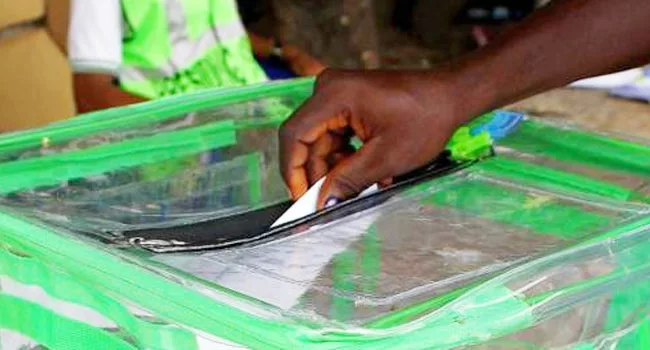Sen Natasha's suspension expired 20 March, Sen Akpabio can continue his illegalities
SENATOR Obong Godswill Akpabio, Senate President, who refuses to imagine for a fleeting second that his role as the chief presiding officer gives him no powers to act outside the law, beyond the reaches of his office, or to ignore the law when it pleases him, serves his purpose, and sounds a warning to others that he is a very powerful man.
Akpabio is one to relish the thought that the law was his to interpret. He might be the law for he swings it to what he wants it to be. A smirk marks each of his victories. They are mostly pyrrhic, and their unimportance is lost on Akpabio who is having the time of his life reducing the Senate to his understanding of law and order.
He has spent almost two years reminding us that he is the Senate President all because he has not been able to make a landmark ruling that aligned with the welfare of the people. Last year, the motion to halt further increase on electricity tariffs was one unmissed Akpabio chance to mock suffering Nigerians. “Let the people breath,” he ruled, accompanied with a roaring laughter that denoted that he had awarded life to Nigerians.
When he suspended Senator Natasha Akpoti-Uduaghan for violating Senate Rules, Akpabio sounded triumphant reading out the verdict of the Committee on Ethics, Privileges, and Code of Conduct.
“That the Senate do suspend Senator Natasha Akpoti-Uduaghan for six months for her total violation of the Senate Standing Rules (2023 as amended for bringing the presiding officer and the entire Nigerian Senate to public opprobrium,” Senate President Godswill Akpabio ruled on Thursday 6 March 2025 reading from the recommendations of the Committee on Ethics, Privileges, and Code of Conduct that probed her claims.
Would Akpabio retrace his steps if he was wrong? There is no chance that he would. Akpabio believes that his status leaves him no time to deal with mere mortals whether they were elected Senators, “court-ordered Senators” like him, his own court judgement all the way from the Supreme Court was uncommon. How would mere mortals, ordinary Nigerians query his decisions?
Akpabio’s aides say he is too busy, too elevated to prattle. Words to that effect were their response to former Vice-President Abubakar Atiku who levied serious allegations against Akpabio.
Senator Natasha’s suspension ended on Thursday 20 March 2025, 8 days ago. Whatever has been happening since then is evidence of the lawlessness of the Senate and its leadership.
The same Senate Rules book from which Akpabio suspended Natasha has 14 days as the maximum number of days that a Senator can be suspended from the National Assembly.
While Akpabio found Natasha’s infractions in the Senate Standing Rules, what provision awarded him the powers to suspend her for six months? What does “total violation” of the Standing Rules mean? Was Natasha being punished for violation or total violation?
Precedents date back to 2010 when a Federal High Court in Abuja ruled that the House of Representatives could not suspend members for more than 14 days. The case involved Dino Melayae and 10 other members.
Justice Dimgba Igwe also ruled in April 2018, that the Senate had no powers to suspend a member for more than 14 days. The case was Ovie Omo-Agege V The Senate which had suspended him for 90 days.
More recently, Senators Ali Ndume and Abdul Ningi were suspended under Akpabio’s leadership, and the courts nullified the suspensions. Ningi had alleged that the Appropriation Committee padded the Appropriation Bill by over N3 trillion.
Order 67(4) of the Senate Rules states that a Senator can only be suspended for a period not exceeding 14 days. What the courts have been doing since 2010 is to draw the attention of the National Assembly to its own law.
Akpabio and the Senate Ethics Committee do not care about Order 67 (4) of the Senate Rules.
MultiChoice as FCCPC’s choice
THE Federal Competition and Consumer Protection Commission, FCCPC, established by the Federal Competition and Consumer Protection Act, FCCPA, in 2018, is a very powerful Commission that should be working for the interests of Nigerians, all Nigerians, and residents of Nigeria.
Grand expectations from the Commission include to develop and promote fair, efficient and competitive markets in the Nigerian economy, facilitate access by all citizens to safe products, and secure the protection of rights for all consumers in Nigeria.
If one is to make a list of goods and services that benefit Nigerians, they would run into hundreds of thousands and their producers and providers could run into millions. What does FCCPC do about them? It does something.
The story was about recently of the Vice President calling Mr. Olatunji Bello, Chief Executive Officer/Executive Vice-Chairman of FCCPC, to re-open a shop that belonged to the Vice-President’s friend. Whatever the offence was, the FCCPC clampdown on the shop was lifted.
Other times one hears about FCCPC are when it takes on MultiChoice, apparently its service provider of choice to exercise its regulatory authority which is still at most vacuous. What is so special about MultiChoice to elicit such attention? The question is pertinent because other providers of the services as MultiChoice do not undergo the same scrutiny.
The issue is always about price adjustments. Once MultiChoice announces a change in the rates for accessing its services, FCCPC bares its regulatory fangs as if its researches do not capture the increases in prices of goods and services across all sectors. Government agencies have been increasing from travel documents, cost of filings in court to petroleum products.
One never heard a whimper from FCCPC. Even shops that it insisted should display prices of goods, determine the mode of compliance which is not in the interest of consumers. FCCPC’s silence may be related to the Vice-President’s calls and the fact that market forces are sometimes political forces – most big businesses know who to call.
Rising energy costs, whether petroleum products or electricity, and insecurity are driving high prices of goods and services. FCCPC knows this but maintains a grave silence about these service providers whose services are more critical to the survival of the economy and Nigerians than digital television.
Cost of financial services has gone up. Merely keeping a bank account comes with new costs. Medications and health services have higher prices daily. School fees are continuously on the rise, including in government institutions. These are goods and services that are very important for the survival of the society.
How many million Nigerians subscribe to MultiChoice which keeps millions of Nigerians employed through the value chain of its service? Why is FCCPC not concerned about the providers of other services and goods that affect more millions of Nigeria?
Every organisation is also blaming the high exchange rate for high prices of goods and services. Is MultiChoice exempt from high foreign exchange costs when it pays for most of its programmes in foreign exchange?
How does FCCPC “promote fair, efficient and competitive markets in the Nigerian economy” which its mandate prices? Competition is supposed to propel market forces to deal with service providers whose services are beyond the reach of consumers.
Does FCCPC have the powers to determine the prices and services? What has it done with airline operators, producers of alcoholic and non-alcoholic beverages, who increase their prices, particularly when demand is high?
FCCPC should stretch its attention to goods and services that are essential. Digital television is not an essential service. Those who can afford it should pay; others can go elsewhere.
Essential as foods are, many Nigerians are dropping some items from their menu. They cannot afford them. FCCPC should know about it or it does not matter.
FCCPC has gone to court to enforce its orders on digital television rates. When will FCCPC go to court over the rising prices of essential goods and services?












